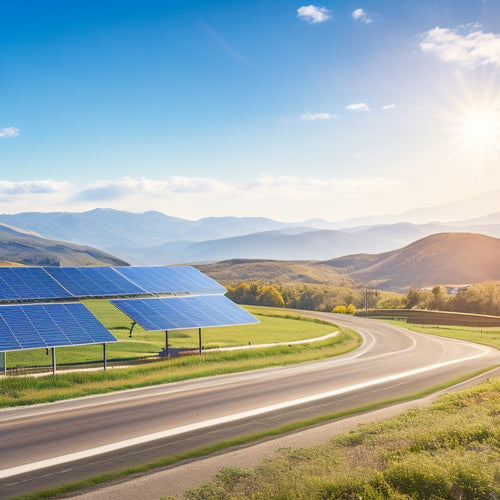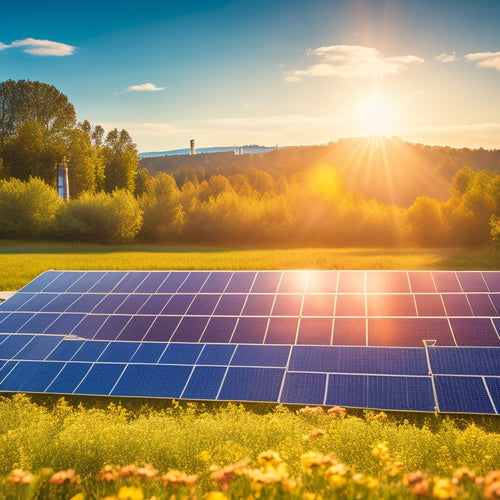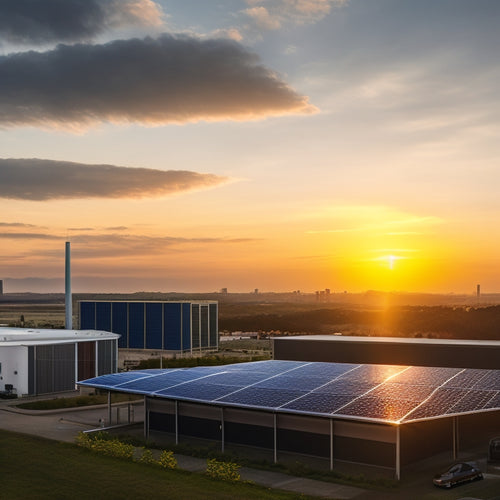
Recommended Solar Panels
Share
When searching for recommended solar panels, look for top-tier models with high energy conversion rates, exceeding 20% efficiency. These advanced technologies, such as multi-junction cells, enhance energy capture and reduce your reliance on non-renewable sources. Maximum power tracking optimizes energy output, ensuring you get the most out of your panels. Evaluating your energy demands is essential to sizing your system accurately. Furthermore, a longer warranty period guarantees reliable performance and increases your property value. By considering these key factors, you'll be well on your way to making an informed decision; and as you investigate further, you'll uncover the perfect blend of efficiency, performance, and value for your unique needs.
The Essentials
- Top-tier solar panels achieve efficiencies over 20%, ensuring maximum power output and reduced reliance on non-renewable sources.
- Look for solar panels with high maximum power output, as they perform better in low-light conditions and support energy independence.
- Maximum Power Tracking (MPT) optimizes energy output, increasing energy yield by up to 25% and reducing carbon footprint.
- Assessing daily energy usage and consumption patterns helps determine the right solar panel system size and capacity for your needs.
- A reliable solar panel should come with a robust performance guarantee, ensuring consistent energy production and savings on utility bills.
Higher Energy Conversion Rate
You're looking for solar panels that can efficiently harvest energy from the sun and provide maximum power output. A higher energy conversion rate is essential to achieving this goal, as it directly impacts the amount of electricity your system can generate.
By prioritizing panels with high energy conversion rates, you'll be able to maximize your energy production and get the most out of your solar investment. Traditional solar panel systems often struggle with limited energy output, but high-efficiency solar panel systems can provide a higher energy output per panel, allowing for installation on smaller properties while still meeting energy needs.
Efficient Energy Harvesting
Most solar panels on the market today boast an impressive energy conversion rate, with the top-tier models reaching efficiencies of over 20%.
As you investigate the world of solar technology, you'll find that efficient energy harvesting is essential for maximizing your energy output. When you choose a high-efficiency solar panel, you're ensuring that more of the sun's energy is converted into usable power for your home or business.
With the goal of achieving grid parity, efficient energy harvesting becomes even more vital, as it directly impacts the cost-effectiveness of solar power generation.
Regarding energy sustainability, efficient energy harvesting is fundamental to reducing your reliance on non-renewable energy sources. By capturing more of the sun's energy, you'll produce fewer emissions and reduce your carbon footprint.
Top-performing solar panels employ advanced technologies like multi-junction cells and back-contact designs to squeeze every last bit of energy from the sun's rays.
When selecting a solar panel, look for models with high energy conversion rates and low temperature coefficients. These features will help you get the most out of your solar investment, ensuring that you're producing clean, sustainable energy for years to come.
Maximum Power Output
Maximum power output is directly tied to a solar panel's energy conversion rate. You want to maximize the energy your solar panels produce to power your home or business. A higher energy conversion rate means more electricity generated per hour of sunlight. This is vital for achieving energy independence and reducing your reliance on the grid.
To give you a better understanding of maximum power output, here's a comparison of four top-rated solar panels:
| Solar Panel Model | Maximum Power Output (W) | Solar Efficiency (%) |
|---|---|---|
| Panasonic HIT-240 | 330 | 21.8 |
| SunPower X-Series | 360 | 22.8 |
| LG NeON 2 | 320 | 20.5 |
| Tesla Solar Roof | 325 | 21.5 |
When selecting solar panels, consider both maximum power output and solar efficiency. Higher efficiency ratings indicate better performance in low-light conditions. Additionally, panel durability is essential for withstanding environmental factors and ensuring consistent energy production over the panel's lifespan. By choosing a solar panel with high maximum power output and solar efficiency, you'll be well on your way to utilizing the power of the sun.
Increased Property Value Boost
Installing recommended solar panels can greatly increase your property's value, allowing you to sell your home at a higher price if you decide to move.
By reducing your electricity bills with affordable energy solutions, such as cost of solar panels, you'll not only save money but also attract potential buyers who value energy efficiency.
You'll also benefit from added home equity, which can be a great financial advantage.
Higher Selling Prices
Value appreciation is a significant benefit of solar panel adoption, with higher selling prices being a direct result of increased property value.
As you consider installing solar panels, you'll be pleased to know that this investment can lead to a substantial enhancement in your property's market value. According to market trends, homes with solar panels sell for a premium compared to those without. This is largely due to consumer preferences shifting towards eco-friendly and sustainable living.
You can expect a higher selling price for your property, thanks to the increased value of your solar-powered home. This is especially true in areas where environmental concerns are high and buyers are willing to pay a premium for energy-efficient features.
In fact, studies have shown that solar panels can increase your property value by up to 17%. This means that if you're planning to sell your home in the future, you can expect a higher return on investment.
Added Home Equity
As you reap the benefits of solar panels, you'll notice a significant increase in your property's value, which directly translates to added home equity. This enhancement in property value is a result of the home improvements you've made by installing solar panels.
According to the National Renewable Energy Laboratory, homeowners who install solar panels can increase their property value by up to $15,000. This increase in value can lead to a significant increase in your home equity, providing you with a sense of financial security and freedom.
The investment benefits of solar panels are undeniable. Not only do they provide a return on investment through reduced energy bills, but they also increase your property value, making your home more attractive to potential buyers if you decide to sell in the future.
Maximum Power Tracking
You'll want to guarantee your solar panels are equipped with maximum power tracking (MPT) to optimize energy output, especially when paired with high-efficiency photovoltaic panels that can capture more energy per hour of sunlight.
This is particularly important for those who want to reduce their energy bills and carbon footprint with efficient home or business solar panel setup.
MPT allows the system to continuously monitor and adjust to changing environmental conditions, maximizing energy yield.
Optimizing Energy Output
Maximum power tracking, a critical component of optimizing energy output, enables solar panels to generate the highest possible amount of power under various environmental conditions. By incorporating maximum power tracking into your solar panel technology, you can guarantee that your system is operating at peak performance, maximizing energy efficiency innovations and reducing your environmental impact.
This is especially important in regions with fluctuating weather patterns, where energy output can be affected by changing sunlight levels.
To optimize energy output, you should consider advanced solar installation techniques, such as tilt and orientation optimization, to maximize exposure to sunlight. Additionally, energy storage advancements, such as battery backup systems, can help stabilize energy output and provide a reliable source of power.
Efficient Power Harvesting
When it comes to extracting the most power from your solar panels, efficient power harvesting through maximum power tracking (MPT) is vital. This technology allows your system to continuously monitor and adjust to changes in sunlight and temperature, ensuring you're getting the most energy possible.
By tracking the maximum power point of your solar panels, MPT optimizes energy output and minimizes losses.
As solar technology trends continue to evolve, advancements in photovoltaic cells have increased their efficiency. However, even with these improvements, MPT remains essential for maximizing energy production. Without it, your system may only operate at a fraction of its potential.
By incorporating MPT into your solar panel system, you can increase energy output by up to 25%. This translates to more power for your home, business, or off-grid expedition, giving you the freedom to live life on your own terms.
With MPT, you can rest assured that you're getting the most out of your solar investment, every day.
Assess Your Energy Demands
You need to determine your daily energy usage to accurately size your solar panel system.
To do this, you'll want to assess your energy consumption patterns, including the times of day when you use the most energy. By understanding your energy demands, you can specify a system that meets your unique needs.
Consider the benefits of off-grid energy solutions and how they can help reduce your utility bills.
Additionally, think about the role renewable energy systems play in providing an efficient and sustainable way to power your home.
Daily Energy Usage
Beyond the type and number of solar panels, your daily energy usage plays a critical role in determining the size and capacity of your solar panel system. To accurately assess your energy demands, you need to understand your daily energy usage patterns. This involves analyzing your energy consumption habits, identifying areas of inefficiency, and optimizing your energy usage.
You can start by tracking your energy consumption over a period of time, noting the peak usage hours, and calculating your average daily energy consumption. This will help you determine the required capacity of your solar panel system.
Additionally, adopting energy-efficient practices, such as using LED bulbs, energy-efficient appliances, and turning off lights during the day, can greatly reduce your energy consumption. By optimizing your energy efficiency, you can reduce the size and cost of your solar panel system, giving you more freedom and flexibility in your energy choices.
Energy Consumption Patterns
Evaluating your energy demands requires a thorough understanding of your energy consumption patterns. You need to know how much energy you use daily, weekly, and monthly to determine the right solar panel system for your needs.
Start by tracking your energy usage over a year to identify patterns and seasonal variations. This will help you pinpoint areas where you can practice energy conservation and optimize your energy consumption.
Assess your energy-intensive appliances, lighting, and heating/cooling systems to see where you can cut back.
Consider switching to energy-efficient alternatives to reduce your overall energy demands. By doing so, you'll not only reduce your carbon footprint but also lower your energy bills.
This, in turn, will enable you to invest in a smaller, more affordable solar panel system that meets your reduced energy needs.
Longer Warranty Period Guaranteed
You want a solar panel that provides a reliable performance guarantee, ensuring you get the most out of your investment.
A longer warranty period gives you peace of mind, as it covers you against defects and performance degradation over an extended period.
Look for manufacturers that offer a minimum of 25 years of warranty on their solar panels, guaranteeing peak energy production and minimizing maintenance costs.
Reliable Performance Guarantee
With a reliable solar panel comes a guarantee that it will perform at its best over an extended period, which is precisely what a longer warranty period provides. You want assurance that your investment will generate clean energy for years to come.
A reliable performance guarantee guarantees that your solar panel system will maintain its efficiency, even under harsh weather conditions. This means you'll enjoy consistent energy production, reducing your reliance on the grid and saving you money on your utility bills.
To achieve this level of reliability, it's crucial to focus on proper installation techniques and regular panel maintenance. A well-installed system will minimize the risk of component failure, while regular cleaning and inspections will prevent issues like dust buildup and hotspots.
Frequently Asked Questions
Can I Install Solar Panels on My Rented Property?
You'll need to obtain your landlord's permission before installing solar panels on your rented property, as it's likely specified in your rental agreements; confirm you get written consent to avoid any potential disputes or lease violations.
How Often Should I Clean My Solar Panels?
You're likely aware that dirty solar panels can lose up to 25% of their efficiency; to maximize energy harvest, you should clean your solar panels every 6-12 months as part of regular solar panel maintenance, adjusting cleaning frequency based on local environmental factors.
Are Solar Panels Resistant to Hail and Extreme Weather?
You're wise to wonder if your solar panels can withstand Mother Nature's fury. Fortunately, most modern panels are designed to resist hail damage and perform well in extreme conditions, ensuring your energy independence isn't compromised.
Can I Use Solar Panels to Charge My Electric Vehicle?
You can charge your electric vehicle using solar panels, but consider the solar panel efficiency and EV charging options to guarantee a seamless experience, as it may require a Level 2 charger and a compatible inverter.
Do Solar Panels Work During Power Outages?
You'll be glad to know that solar panels can work during power outages, but only if you have a solar battery system that provides grid independence, allowing you to capture and store energy for when you need it most.
Final Thoughts
You've weighed the pros and cons, and now it's time to go solar. On one hand, you'll be stuck with mediocre panels that fail to maximize your energy conversion rate, leaving you with higher energy bills. On the other hand, you can invest in top-tier solar panels that enhance your property value, track power output in real-time, and come with an extended warranty. The choice is clear: don't settle for anything less than the best. Upgrade to recommended solar panels and reap the rewards of sustainable energy.
Related Posts
-

Is Switching to Green Energy Solutions Easy
Switching to green energy solutions isn't just easy; it's also beneficial. You can greatly cut utility costs and enjo...
-

Advantages of Solar Generating Systems Over Traditional Energy
Solar generating systems provide several key advantages over traditional energy sources. You'll experience lower long...
-

Advantages of Commercial Solar Battery On-Site Storage
By investing in a commercial solar battery on-site storage system, you can greatly reduce your energy grid dependence...


